COMM 3201: Exploring the Impact of AI on Communication Trends
VerifiedAdded on 2023/06/04
|8
|1794
|131
Report
AI Summary
This report explores the multifaceted impact of artificial intelligence on communication, highlighting both its benefits and potential drawbacks. It delves into how AI enhances efficiency, decision-making, and accessibility through applications like virtual assistants. The report also addresses concerns such as job displacement, ethical considerations, and over-reliance on machines. It further emphasizes the importance of responsible AI implementation, recommending careful monitoring, ethical guidelines, and ongoing research to maximize benefits while mitigating societal risks. The analysis concludes that while AI offers significant advantages, a balanced approach is crucial to ensure its positive integration into communication practices and society as a whole. Desklib offers a variety of study tools and solved assignments to assist students in their academic pursuits.

Running head: Communication
Communication
2018
Communication
2018
Paraphrase This Document
Need a fresh take? Get an instant paraphrase of this document with our AI Paraphraser
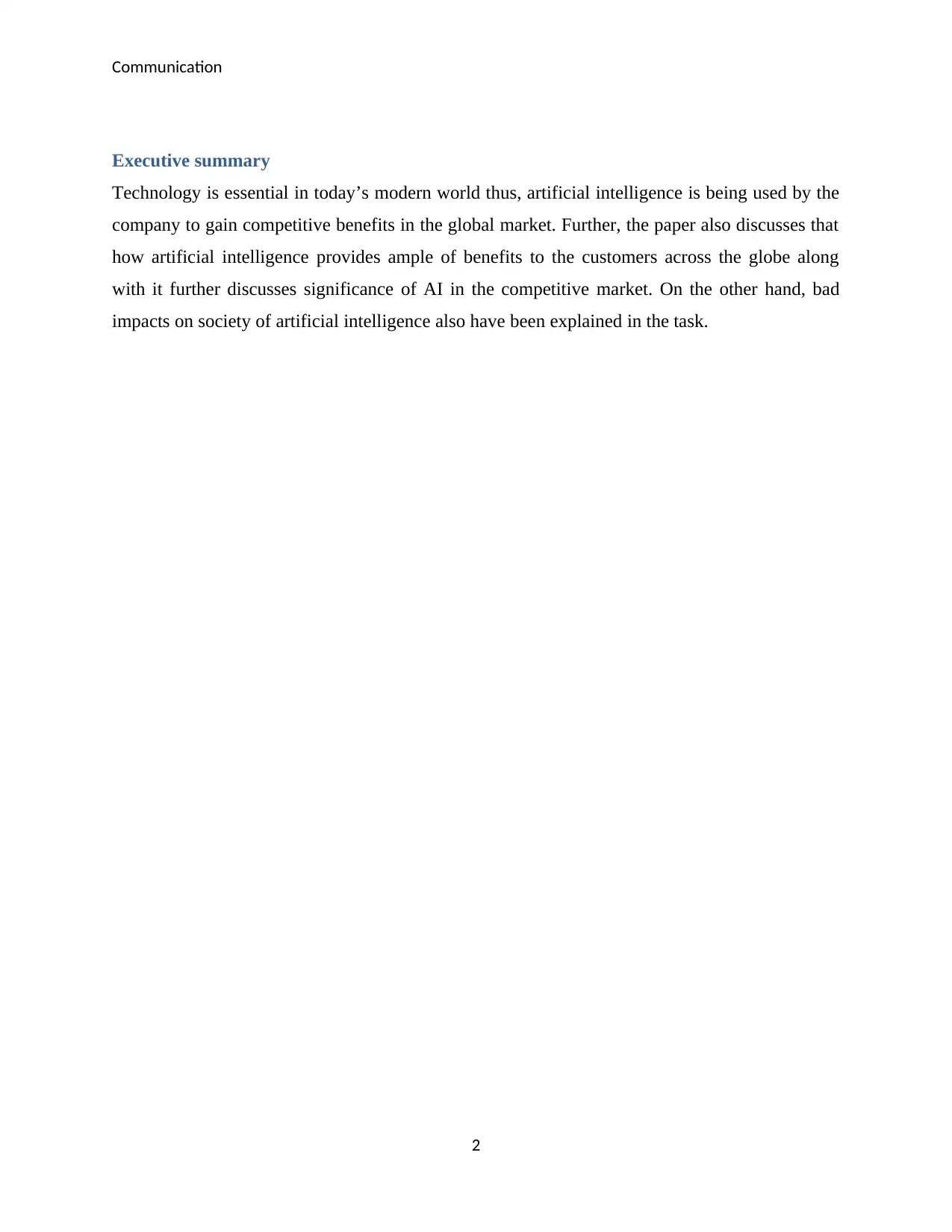
Communication
Executive summary
Technology is essential in today’s modern world thus, artificial intelligence is being used by the
company to gain competitive benefits in the global market. Further, the paper also discusses that
how artificial intelligence provides ample of benefits to the customers across the globe along
with it further discusses significance of AI in the competitive market. On the other hand, bad
impacts on society of artificial intelligence also have been explained in the task.
2
Executive summary
Technology is essential in today’s modern world thus, artificial intelligence is being used by the
company to gain competitive benefits in the global market. Further, the paper also discusses that
how artificial intelligence provides ample of benefits to the customers across the globe along
with it further discusses significance of AI in the competitive market. On the other hand, bad
impacts on society of artificial intelligence also have been explained in the task.
2
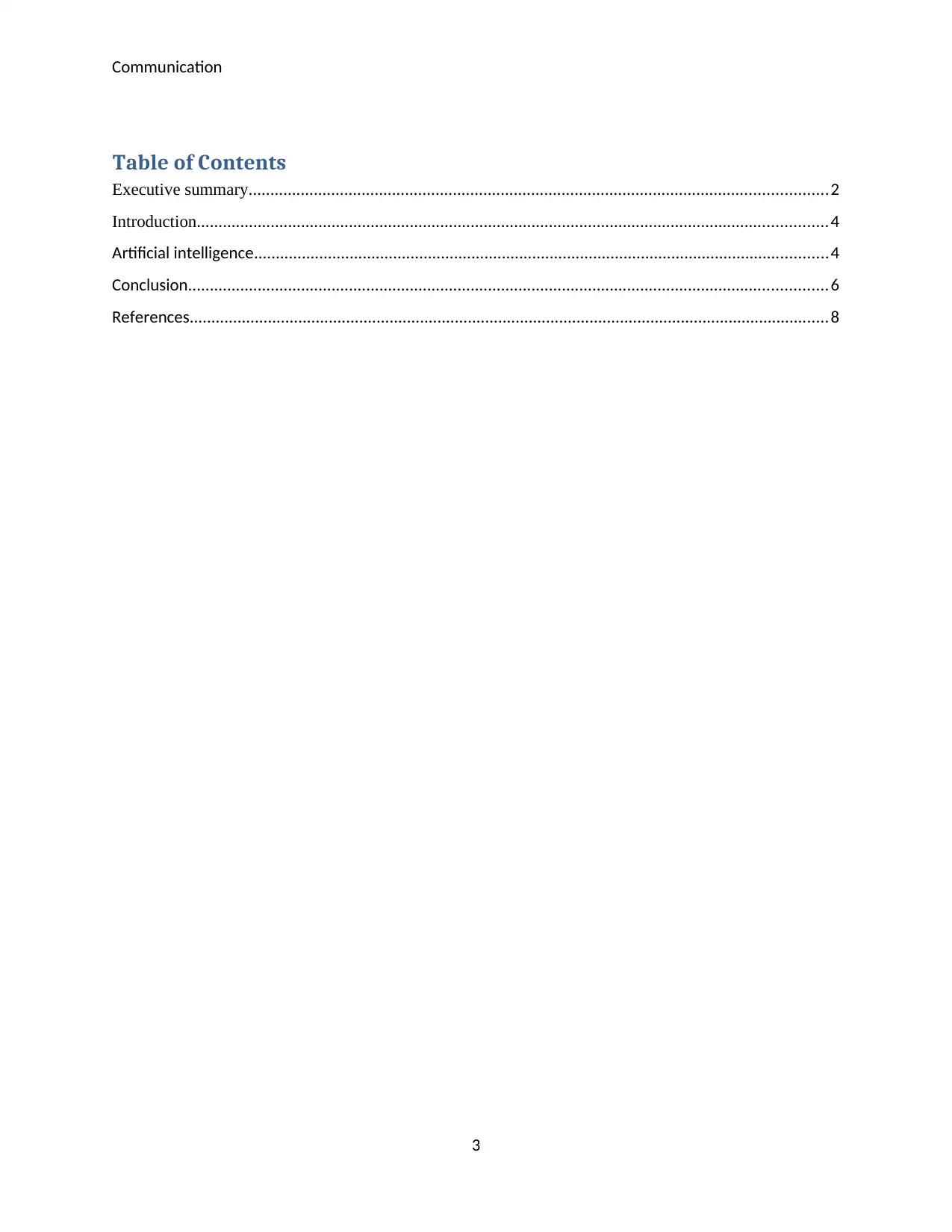
Communication
Table of Contents
Executive summary.....................................................................................................................................2
Introduction.................................................................................................................................................4
Artificial intelligence....................................................................................................................................4
Conclusion...................................................................................................................................................6
References...................................................................................................................................................8
3
Table of Contents
Executive summary.....................................................................................................................................2
Introduction.................................................................................................................................................4
Artificial intelligence....................................................................................................................................4
Conclusion...................................................................................................................................................6
References...................................................................................................................................................8
3
⊘ This is a preview!⊘
Do you want full access?
Subscribe today to unlock all pages.

Trusted by 1+ million students worldwide
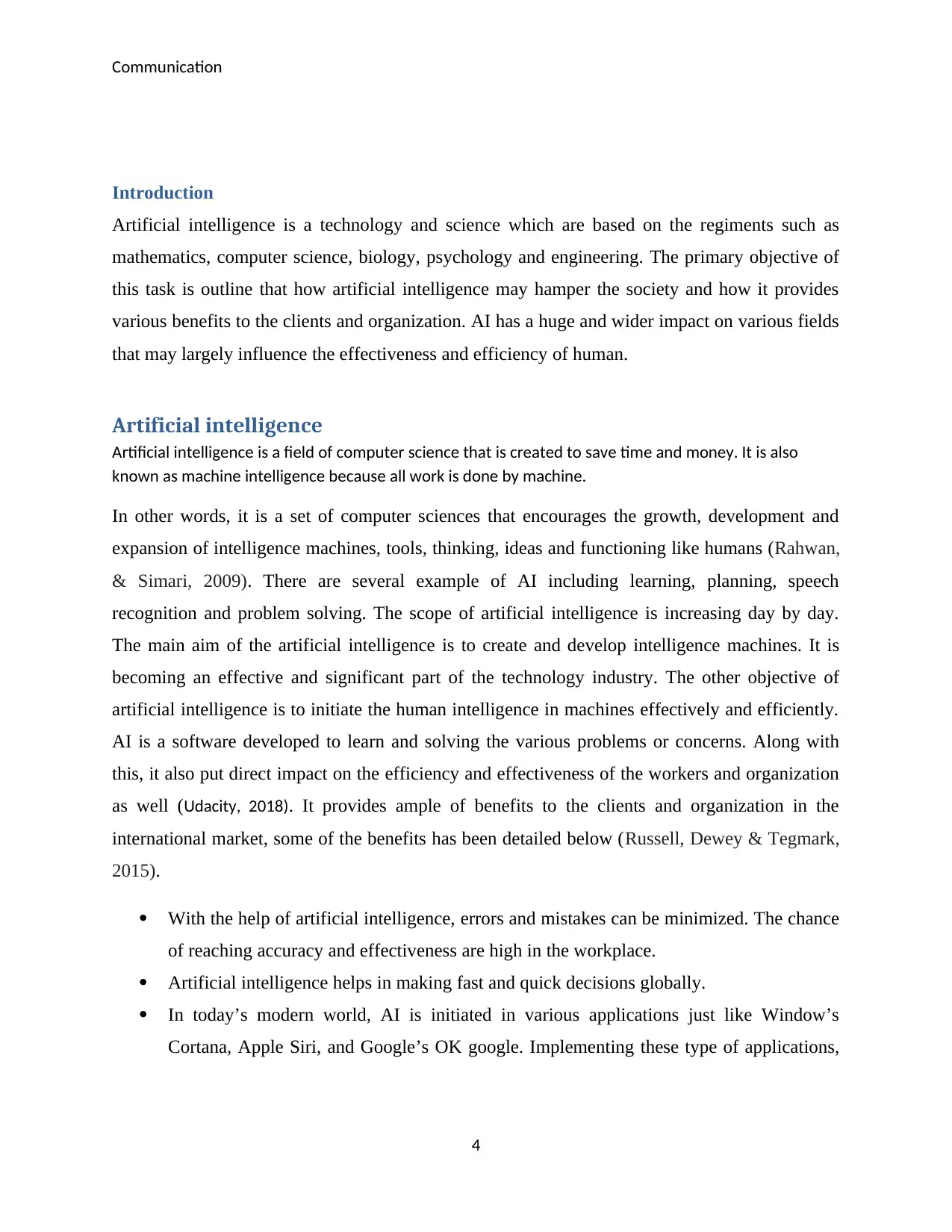
Communication
Introduction
Artificial intelligence is a technology and science which are based on the regiments such as
mathematics, computer science, biology, psychology and engineering. The primary objective of
this task is outline that how artificial intelligence may hamper the society and how it provides
various benefits to the clients and organization. AI has a huge and wider impact on various fields
that may largely influence the effectiveness and efficiency of human.
Artificial intelligence
Artificial intelligence is a field of computer science that is created to save time and money. It is also
known as machine intelligence because all work is done by machine.
In other words, it is a set of computer sciences that encourages the growth, development and
expansion of intelligence machines, tools, thinking, ideas and functioning like humans (Rahwan,
& Simari, 2009). There are several example of AI including learning, planning, speech
recognition and problem solving. The scope of artificial intelligence is increasing day by day.
The main aim of the artificial intelligence is to create and develop intelligence machines. It is
becoming an effective and significant part of the technology industry. The other objective of
artificial intelligence is to initiate the human intelligence in machines effectively and efficiently.
AI is a software developed to learn and solving the various problems or concerns. Along with
this, it also put direct impact on the efficiency and effectiveness of the workers and organization
as well (Udacity, 2018). It provides ample of benefits to the clients and organization in the
international market, some of the benefits has been detailed below (Russell, Dewey & Tegmark,
2015).
With the help of artificial intelligence, errors and mistakes can be minimized. The chance
of reaching accuracy and effectiveness are high in the workplace.
Artificial intelligence helps in making fast and quick decisions globally.
In today’s modern world, AI is initiated in various applications just like Window’s
Cortana, Apple Siri, and Google’s OK google. Implementing these type of applications,
4
Introduction
Artificial intelligence is a technology and science which are based on the regiments such as
mathematics, computer science, biology, psychology and engineering. The primary objective of
this task is outline that how artificial intelligence may hamper the society and how it provides
various benefits to the clients and organization. AI has a huge and wider impact on various fields
that may largely influence the effectiveness and efficiency of human.
Artificial intelligence
Artificial intelligence is a field of computer science that is created to save time and money. It is also
known as machine intelligence because all work is done by machine.
In other words, it is a set of computer sciences that encourages the growth, development and
expansion of intelligence machines, tools, thinking, ideas and functioning like humans (Rahwan,
& Simari, 2009). There are several example of AI including learning, planning, speech
recognition and problem solving. The scope of artificial intelligence is increasing day by day.
The main aim of the artificial intelligence is to create and develop intelligence machines. It is
becoming an effective and significant part of the technology industry. The other objective of
artificial intelligence is to initiate the human intelligence in machines effectively and efficiently.
AI is a software developed to learn and solving the various problems or concerns. Along with
this, it also put direct impact on the efficiency and effectiveness of the workers and organization
as well (Udacity, 2018). It provides ample of benefits to the clients and organization in the
international market, some of the benefits has been detailed below (Russell, Dewey & Tegmark,
2015).
With the help of artificial intelligence, errors and mistakes can be minimized. The chance
of reaching accuracy and effectiveness are high in the workplace.
Artificial intelligence helps in making fast and quick decisions globally.
In today’s modern world, AI is initiated in various applications just like Window’s
Cortana, Apple Siri, and Google’s OK google. Implementing these type of applications,
4
Paraphrase This Document
Need a fresh take? Get an instant paraphrase of this document with our AI Paraphraser
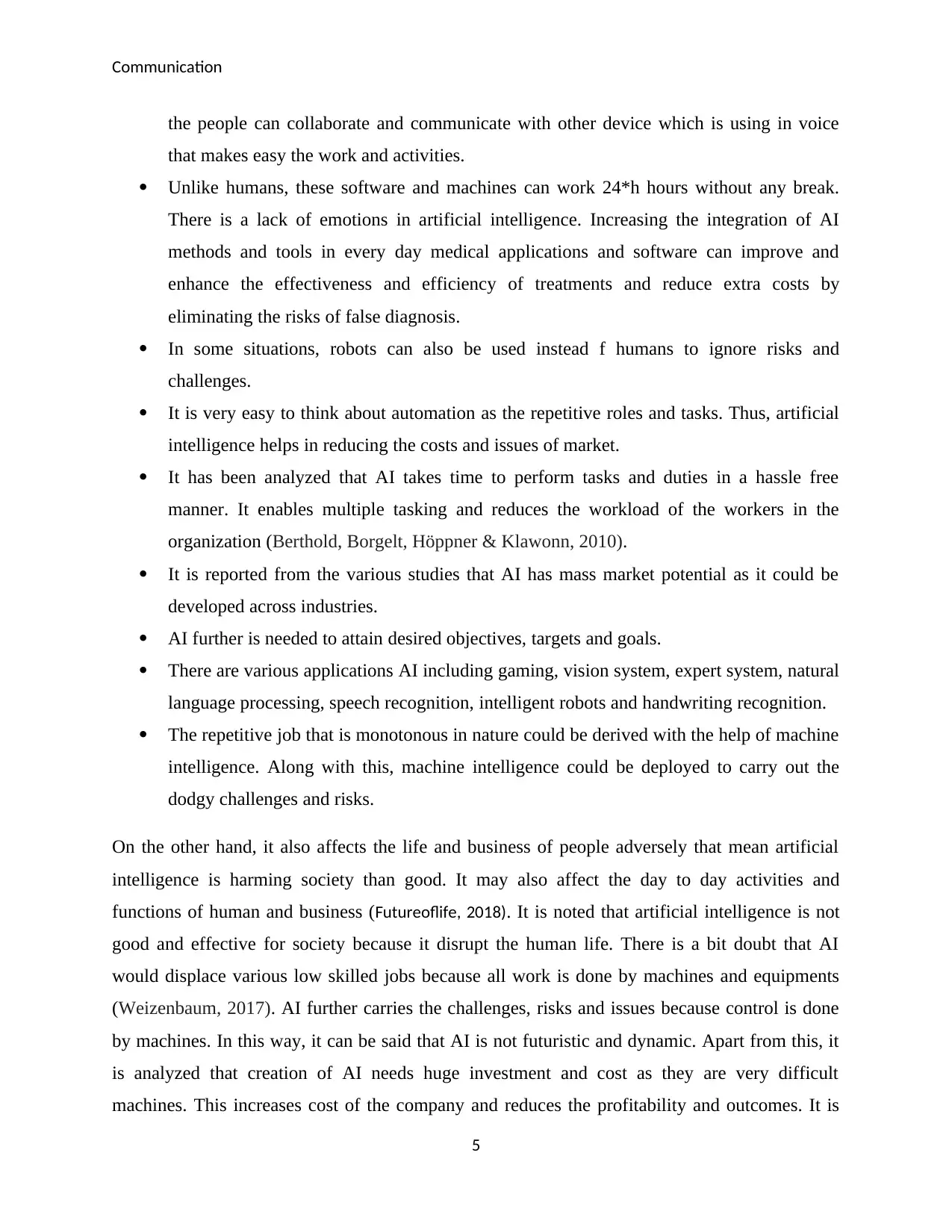
Communication
the people can collaborate and communicate with other device which is using in voice
that makes easy the work and activities.
Unlike humans, these software and machines can work 24*h hours without any break.
There is a lack of emotions in artificial intelligence. Increasing the integration of AI
methods and tools in every day medical applications and software can improve and
enhance the effectiveness and efficiency of treatments and reduce extra costs by
eliminating the risks of false diagnosis.
In some situations, robots can also be used instead f humans to ignore risks and
challenges.
It is very easy to think about automation as the repetitive roles and tasks. Thus, artificial
intelligence helps in reducing the costs and issues of market.
It has been analyzed that AI takes time to perform tasks and duties in a hassle free
manner. It enables multiple tasking and reduces the workload of the workers in the
organization (Berthold, Borgelt, Höppner & Klawonn, 2010).
It is reported from the various studies that AI has mass market potential as it could be
developed across industries.
AI further is needed to attain desired objectives, targets and goals.
There are various applications AI including gaming, vision system, expert system, natural
language processing, speech recognition, intelligent robots and handwriting recognition.
The repetitive job that is monotonous in nature could be derived with the help of machine
intelligence. Along with this, machine intelligence could be deployed to carry out the
dodgy challenges and risks.
On the other hand, it also affects the life and business of people adversely that mean artificial
intelligence is harming society than good. It may also affect the day to day activities and
functions of human and business (Futureoflife, 2018). It is noted that artificial intelligence is not
good and effective for society because it disrupt the human life. There is a bit doubt that AI
would displace various low skilled jobs because all work is done by machines and equipments
(Weizenbaum, 2017). AI further carries the challenges, risks and issues because control is done
by machines. In this way, it can be said that AI is not futuristic and dynamic. Apart from this, it
is analyzed that creation of AI needs huge investment and cost as they are very difficult
machines. This increases cost of the company and reduces the profitability and outcomes. It is
5
the people can collaborate and communicate with other device which is using in voice
that makes easy the work and activities.
Unlike humans, these software and machines can work 24*h hours without any break.
There is a lack of emotions in artificial intelligence. Increasing the integration of AI
methods and tools in every day medical applications and software can improve and
enhance the effectiveness and efficiency of treatments and reduce extra costs by
eliminating the risks of false diagnosis.
In some situations, robots can also be used instead f humans to ignore risks and
challenges.
It is very easy to think about automation as the repetitive roles and tasks. Thus, artificial
intelligence helps in reducing the costs and issues of market.
It has been analyzed that AI takes time to perform tasks and duties in a hassle free
manner. It enables multiple tasking and reduces the workload of the workers in the
organization (Berthold, Borgelt, Höppner & Klawonn, 2010).
It is reported from the various studies that AI has mass market potential as it could be
developed across industries.
AI further is needed to attain desired objectives, targets and goals.
There are various applications AI including gaming, vision system, expert system, natural
language processing, speech recognition, intelligent robots and handwriting recognition.
The repetitive job that is monotonous in nature could be derived with the help of machine
intelligence. Along with this, machine intelligence could be deployed to carry out the
dodgy challenges and risks.
On the other hand, it also affects the life and business of people adversely that mean artificial
intelligence is harming society than good. It may also affect the day to day activities and
functions of human and business (Futureoflife, 2018). It is noted that artificial intelligence is not
good and effective for society because it disrupt the human life. There is a bit doubt that AI
would displace various low skilled jobs because all work is done by machines and equipments
(Weizenbaum, 2017). AI further carries the challenges, risks and issues because control is done
by machines. In this way, it can be said that AI is not futuristic and dynamic. Apart from this, it
is analyzed that creation of AI needs huge investment and cost as they are very difficult
machines. This increases cost of the company and reduces the profitability and outcomes. It is
5
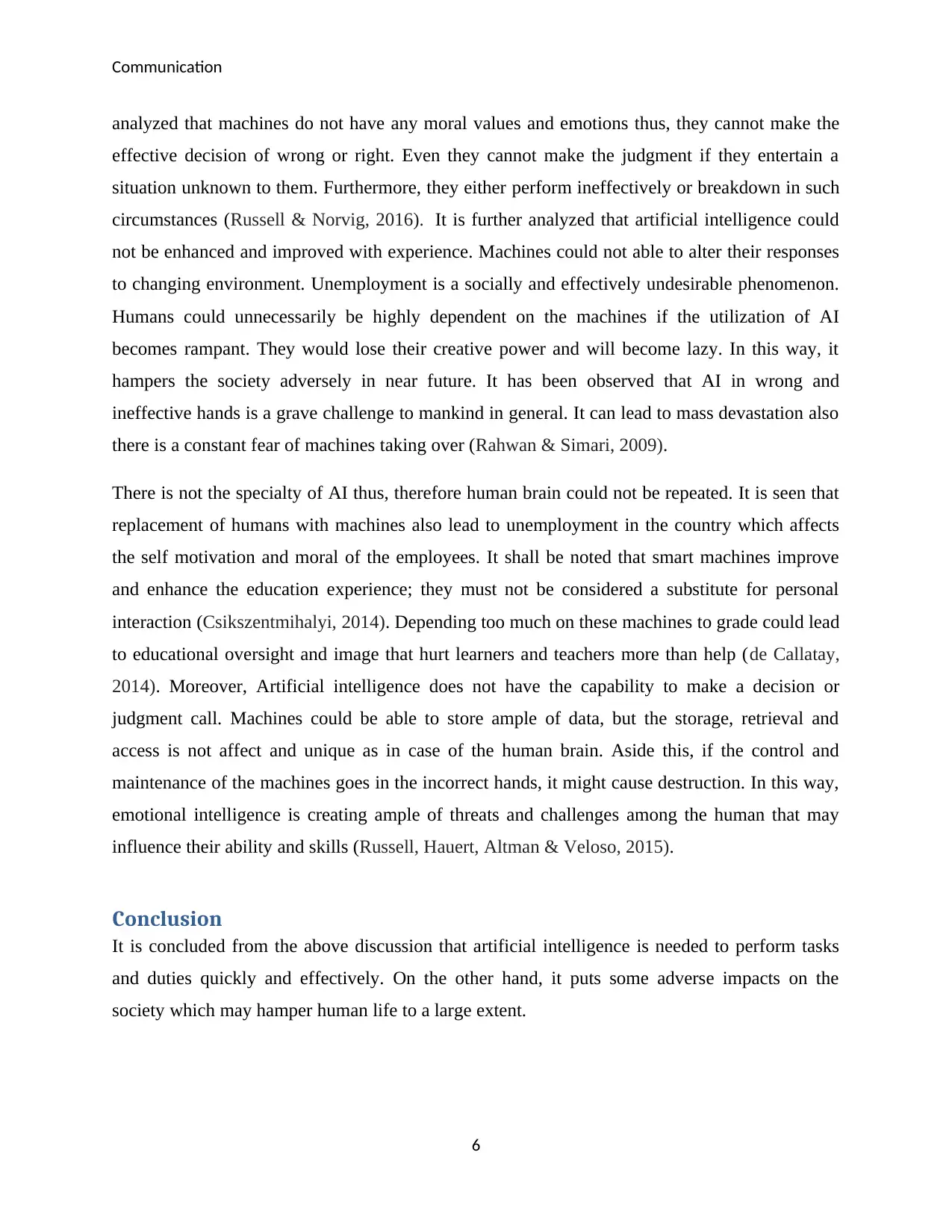
Communication
analyzed that machines do not have any moral values and emotions thus, they cannot make the
effective decision of wrong or right. Even they cannot make the judgment if they entertain a
situation unknown to them. Furthermore, they either perform ineffectively or breakdown in such
circumstances (Russell & Norvig, 2016). It is further analyzed that artificial intelligence could
not be enhanced and improved with experience. Machines could not able to alter their responses
to changing environment. Unemployment is a socially and effectively undesirable phenomenon.
Humans could unnecessarily be highly dependent on the machines if the utilization of AI
becomes rampant. They would lose their creative power and will become lazy. In this way, it
hampers the society adversely in near future. It has been observed that AI in wrong and
ineffective hands is a grave challenge to mankind in general. It can lead to mass devastation also
there is a constant fear of machines taking over (Rahwan & Simari, 2009).
There is not the specialty of AI thus, therefore human brain could not be repeated. It is seen that
replacement of humans with machines also lead to unemployment in the country which affects
the self motivation and moral of the employees. It shall be noted that smart machines improve
and enhance the education experience; they must not be considered a substitute for personal
interaction (Csikszentmihalyi, 2014). Depending too much on these machines to grade could lead
to educational oversight and image that hurt learners and teachers more than help (de Callatay,
2014). Moreover, Artificial intelligence does not have the capability to make a decision or
judgment call. Machines could be able to store ample of data, but the storage, retrieval and
access is not affect and unique as in case of the human brain. Aside this, if the control and
maintenance of the machines goes in the incorrect hands, it might cause destruction. In this way,
emotional intelligence is creating ample of threats and challenges among the human that may
influence their ability and skills (Russell, Hauert, Altman & Veloso, 2015).
Conclusion
It is concluded from the above discussion that artificial intelligence is needed to perform tasks
and duties quickly and effectively. On the other hand, it puts some adverse impacts on the
society which may hamper human life to a large extent.
6
analyzed that machines do not have any moral values and emotions thus, they cannot make the
effective decision of wrong or right. Even they cannot make the judgment if they entertain a
situation unknown to them. Furthermore, they either perform ineffectively or breakdown in such
circumstances (Russell & Norvig, 2016). It is further analyzed that artificial intelligence could
not be enhanced and improved with experience. Machines could not able to alter their responses
to changing environment. Unemployment is a socially and effectively undesirable phenomenon.
Humans could unnecessarily be highly dependent on the machines if the utilization of AI
becomes rampant. They would lose their creative power and will become lazy. In this way, it
hampers the society adversely in near future. It has been observed that AI in wrong and
ineffective hands is a grave challenge to mankind in general. It can lead to mass devastation also
there is a constant fear of machines taking over (Rahwan & Simari, 2009).
There is not the specialty of AI thus, therefore human brain could not be repeated. It is seen that
replacement of humans with machines also lead to unemployment in the country which affects
the self motivation and moral of the employees. It shall be noted that smart machines improve
and enhance the education experience; they must not be considered a substitute for personal
interaction (Csikszentmihalyi, 2014). Depending too much on these machines to grade could lead
to educational oversight and image that hurt learners and teachers more than help (de Callatay,
2014). Moreover, Artificial intelligence does not have the capability to make a decision or
judgment call. Machines could be able to store ample of data, but the storage, retrieval and
access is not affect and unique as in case of the human brain. Aside this, if the control and
maintenance of the machines goes in the incorrect hands, it might cause destruction. In this way,
emotional intelligence is creating ample of threats and challenges among the human that may
influence their ability and skills (Russell, Hauert, Altman & Veloso, 2015).
Conclusion
It is concluded from the above discussion that artificial intelligence is needed to perform tasks
and duties quickly and effectively. On the other hand, it puts some adverse impacts on the
society which may hamper human life to a large extent.
6
⊘ This is a preview!⊘
Do you want full access?
Subscribe today to unlock all pages.

Trusted by 1+ million students worldwide
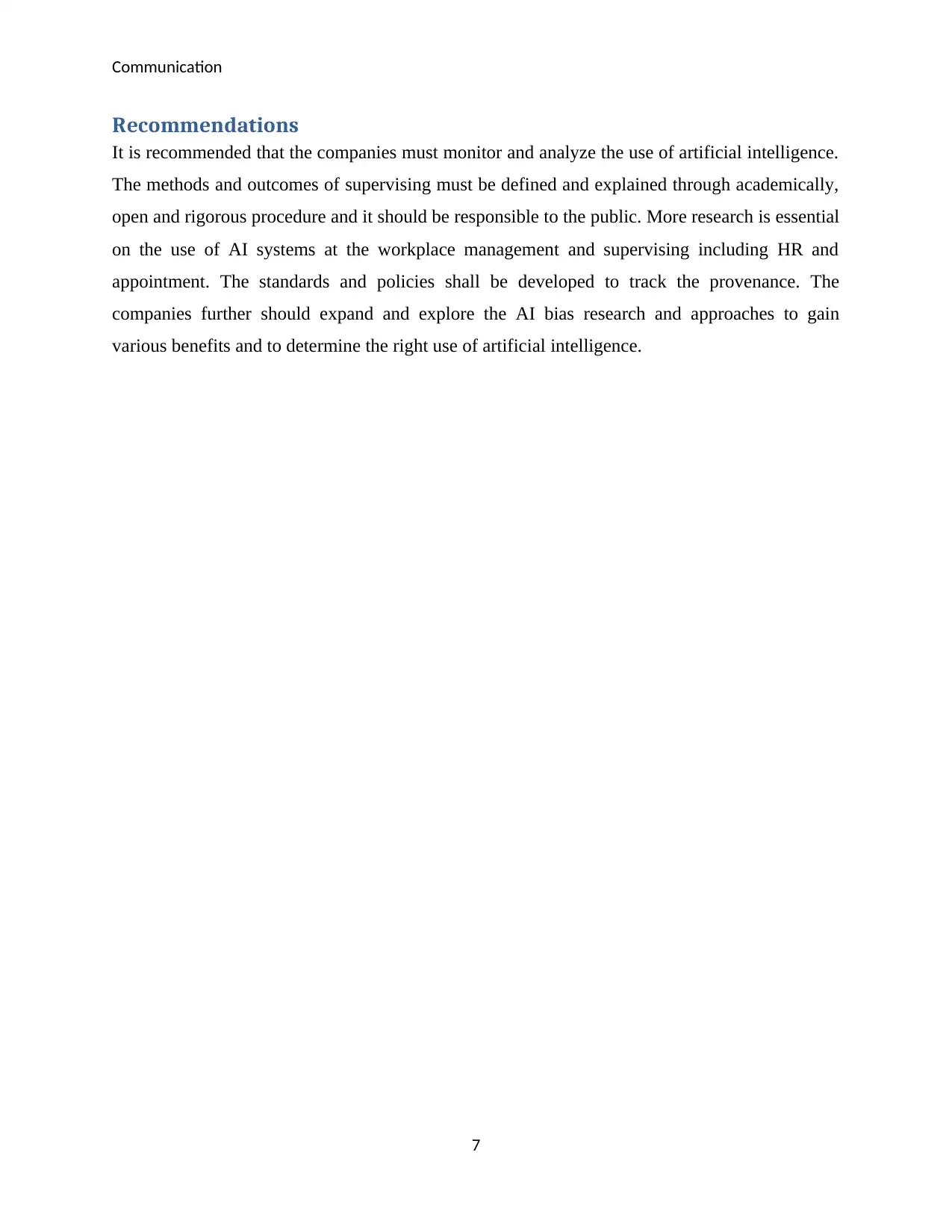
Communication
Recommendations
It is recommended that the companies must monitor and analyze the use of artificial intelligence.
The methods and outcomes of supervising must be defined and explained through academically,
open and rigorous procedure and it should be responsible to the public. More research is essential
on the use of AI systems at the workplace management and supervising including HR and
appointment. The standards and policies shall be developed to track the provenance. The
companies further should expand and explore the AI bias research and approaches to gain
various benefits and to determine the right use of artificial intelligence.
7
Recommendations
It is recommended that the companies must monitor and analyze the use of artificial intelligence.
The methods and outcomes of supervising must be defined and explained through academically,
open and rigorous procedure and it should be responsible to the public. More research is essential
on the use of AI systems at the workplace management and supervising including HR and
appointment. The standards and policies shall be developed to track the provenance. The
companies further should expand and explore the AI bias research and approaches to gain
various benefits and to determine the right use of artificial intelligence.
7
Paraphrase This Document
Need a fresh take? Get an instant paraphrase of this document with our AI Paraphraser
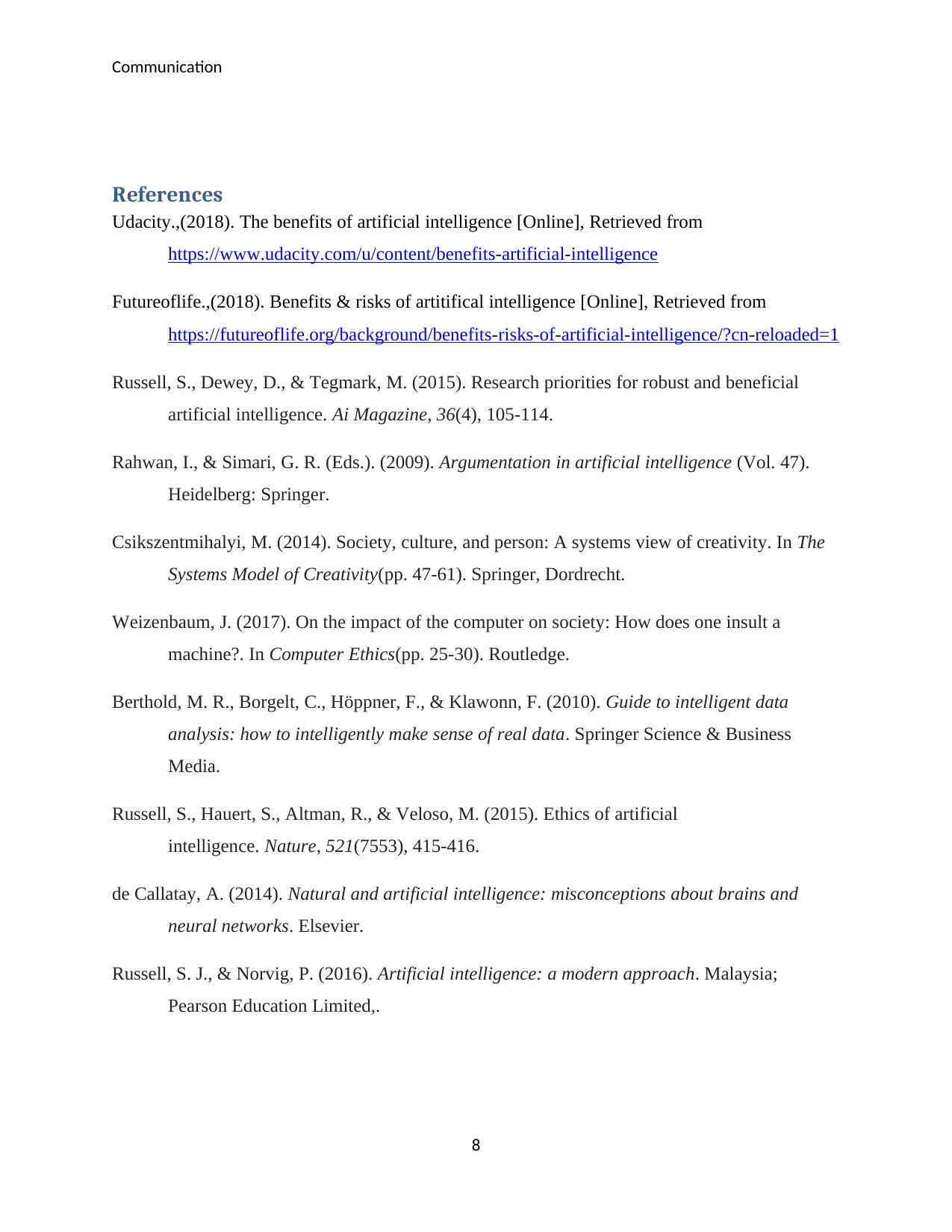
Communication
References
Udacity.,(2018). The benefits of artificial intelligence [Online], Retrieved from
https://www.udacity.com/u/content/benefits-artificial-intelligence
Futureoflife.,(2018). Benefits & risks of artitifical intelligence [Online], Retrieved from
https://futureoflife.org/background/benefits-risks-of-artificial-intelligence/?cn-reloaded=1
Russell, S., Dewey, D., & Tegmark, M. (2015). Research priorities for robust and beneficial
artificial intelligence. Ai Magazine, 36(4), 105-114.
Rahwan, I., & Simari, G. R. (Eds.). (2009). Argumentation in artificial intelligence (Vol. 47).
Heidelberg: Springer.
Csikszentmihalyi, M. (2014). Society, culture, and person: A systems view of creativity. In The
Systems Model of Creativity(pp. 47-61). Springer, Dordrecht.
Weizenbaum, J. (2017). On the impact of the computer on society: How does one insult a
machine?. In Computer Ethics(pp. 25-30). Routledge.
Berthold, M. R., Borgelt, C., Höppner, F., & Klawonn, F. (2010). Guide to intelligent data
analysis: how to intelligently make sense of real data. Springer Science & Business
Media.
Russell, S., Hauert, S., Altman, R., & Veloso, M. (2015). Ethics of artificial
intelligence. Nature, 521(7553), 415-416.
de Callatay, A. (2014). Natural and artificial intelligence: misconceptions about brains and
neural networks. Elsevier.
Russell, S. J., & Norvig, P. (2016). Artificial intelligence: a modern approach. Malaysia;
Pearson Education Limited,.
8
References
Udacity.,(2018). The benefits of artificial intelligence [Online], Retrieved from
https://www.udacity.com/u/content/benefits-artificial-intelligence
Futureoflife.,(2018). Benefits & risks of artitifical intelligence [Online], Retrieved from
https://futureoflife.org/background/benefits-risks-of-artificial-intelligence/?cn-reloaded=1
Russell, S., Dewey, D., & Tegmark, M. (2015). Research priorities for robust and beneficial
artificial intelligence. Ai Magazine, 36(4), 105-114.
Rahwan, I., & Simari, G. R. (Eds.). (2009). Argumentation in artificial intelligence (Vol. 47).
Heidelberg: Springer.
Csikszentmihalyi, M. (2014). Society, culture, and person: A systems view of creativity. In The
Systems Model of Creativity(pp. 47-61). Springer, Dordrecht.
Weizenbaum, J. (2017). On the impact of the computer on society: How does one insult a
machine?. In Computer Ethics(pp. 25-30). Routledge.
Berthold, M. R., Borgelt, C., Höppner, F., & Klawonn, F. (2010). Guide to intelligent data
analysis: how to intelligently make sense of real data. Springer Science & Business
Media.
Russell, S., Hauert, S., Altman, R., & Veloso, M. (2015). Ethics of artificial
intelligence. Nature, 521(7553), 415-416.
de Callatay, A. (2014). Natural and artificial intelligence: misconceptions about brains and
neural networks. Elsevier.
Russell, S. J., & Norvig, P. (2016). Artificial intelligence: a modern approach. Malaysia;
Pearson Education Limited,.
8
1 out of 8
Related Documents
Your All-in-One AI-Powered Toolkit for Academic Success.
+13062052269
info@desklib.com
Available 24*7 on WhatsApp / Email
![[object Object]](/_next/static/media/star-bottom.7253800d.svg)
Unlock your academic potential
Copyright © 2020–2026 A2Z Services. All Rights Reserved. Developed and managed by ZUCOL.





